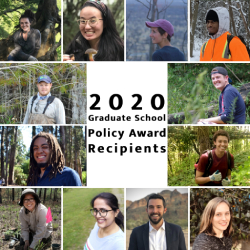Advocating for Ecological Science
ESA places advocacy for ecological science and its application by decisionmakers among its most important functions. We promote the value and importance of ecology to the public as well as to policymakers, work to advance the visibility and quality of ecological education, and give voice to the needs and aspirations of ecologists.
 Bringing Ecology into Policy Decisions
Bringing Ecology into Policy Decisions
ESA works to infuse ecological knowledge into national policy decisions, engaging in science policy efforts to inform policy affecting the ecological community and foster support for research and STEM education. We connect our members with policymakers and join with other scientific associations to amplify its messages for policymakers through membership in coalitions, including the Climate Science Working Group, Coalition for National Science Funding, USGS Coalition, NDD United, and National Environmental Coalition on Invasive Species, the Energy Sciences Coalition, the STEM Coalition, the Agriculture and Food Research Initiative (AFRI) Coalition and Friends of the Agricultural Research Service Coalition.
Webinars of note that touch on the correct use of ecological science included “Invasive Species Policy and COVID-19”, with distinguished ecologist Dan Simberloff, invasive species experts Jim Carlton and Laura Meyerson and disease ecologist Nina Fefferman. We also welcomed Federation of American Scientists President Ali Nouri, who spoke with ESA members about his organization’s Congressional Science Policy Initiative (CSPI). This program seeks to bring scientific expertise into Congressional hearings. Engineers and Scientists Acting Locally (ESAL) held a webinar with us to discuss the ways ecologists can engage with local government and use their expertise and inquiry-driven, evidence-based approaches to inform policy decisions. ESAL highlighted examples of scientists who have made substantive contributions to their communities, often without a major career shift.
Policy Letters and Statements
ESA issued or co-signed more than 42 letters or statements to policymakers last year. Topics covered include federal funding for scientific research, support for specific pieces of legislation and concerns with new proposed regulations from the Trump administration. ESA also joined with other scientific societies to request relief for federally funded researchers in response to the coronavirus pandemic and push back against increased restrictions on student visas. Other letters requested increased funding for wildlife disease programs and increased funding for scientific infrastructure in coronavirus response packages. Several policy statements garnered press as news outlets looked toward scientific societies to contextualize new policies.
In October 2020, ESA President Kathleen Weathers, Immediate Past President Osvaldo Sala, President-elect Dennis Ojima and Executive Director Catherine O’Riordan issued a statement condemning the Trump administration’s decision to withdraw the United States from the Paris Climate Agreement.
Presidential Transition
After the 2020 presidential election, we held a webinar for ESA members about the election results and the implications for scientific and environmental policy. As the Biden administration announced it nominees for cabinet picks, our public affairs office kept the transition tracker up to date. We also issued an action alert for members to suggest programs, reports and data sets that require attention in the Biden administration. ESA representatives met with members of Biden’s transition team.
Graduate Student Policy Award
ESA awarded the Graduate Student Policy Award to 12 ESA members in 2020: Tiffany L. Betras (University of Pittsburgh), Callie R. Chappell (Stanford University), Claire E. Couch (Oregon State University), Ayo Andra J. Deas (The Graduate Center, City University of New York), Ed Higgins (University of Oklahoma), Renata Poulton Kamakura (Duke University), Alexander K. Killion (University of Michigan), Mayda Nathan (University of Maryland), Vasavi Prakash (Auburn University), Natali R. Ramirez-Bullon (Florida State University), Bradley A. Strickland (Florida International University) and Harrison R. Watson (Princeton University).
The in-person Graduate Student Policy Award event scheduled for March 2020 was cancelled due to the coronavirus pandemic. The 2020 GSPA cohort reconvened in the fall for a series of virtual trainings about science communications and policy and a careers panel with other ESA members working in policy. The virtual event culminated with a series of calls and video conferences with Hill staff, where the GSPA cohort requested the Members of Congress support $9 billion for the National Science Foundation in fiscal year 2021 and co-sponsor the RISE Act, which authorizes emergency relief funding for federal science agencies.
